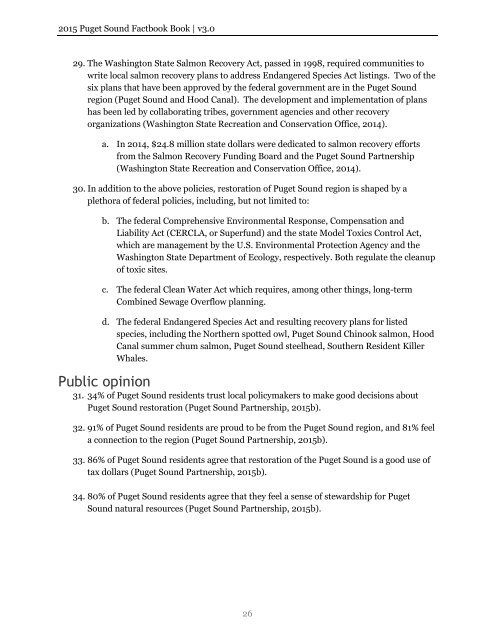Create successful ePaper yourself
Turn your PDF publications into a flip-book with our unique Google optimized e-Paper software.
2015 <strong>Puget</strong> <strong>Sound</strong> Factbook Book | v3.0<br />
29. The Washington State Salmon Recovery Act, passed in 1998, required communities to<br />
write local salmon recovery plans to address Endangered Species Act listings. Two of <strong>the</strong><br />
six plans that have been approved by <strong>the</strong> federal government are in <strong>the</strong> <strong>Puget</strong> <strong>Sound</strong><br />
region (<strong>Puget</strong> <strong>Sound</strong> and Hood Canal). The development and implementation of plans<br />
has been led by collaborating tribes, government agencies and o<strong>the</strong>r recovery<br />
organizations (Washington State Recreation and Conservation Office, 2014).<br />
a. In 2014, $24.8 million state dollars were dedicated to salmon recovery efforts<br />
from <strong>the</strong> Salmon Recovery Funding Board and <strong>the</strong> <strong>Puget</strong> <strong>Sound</strong> Partnership<br />
(Washington State Recreation and Conservation Office, 2014).<br />
30. In addition to <strong>the</strong> above policies, restoration of <strong>Puget</strong> <strong>Sound</strong> region is shaped by a<br />
plethora of federal policies, including, but not limited to:<br />
b. The federal Comprehensive Environmental Response, Compensation and<br />
Liability Act (CERCLA, or Superfund) and <strong>the</strong> state Model Toxics Control Act,<br />
which are management by <strong>the</strong> U.S. Environmental Protection Agency and <strong>the</strong><br />
Washington State Department of Ecology, respectively. Both regulate <strong>the</strong> cleanup<br />
of toxic sites.<br />
c. The federal Clean Water Act which requires, among o<strong>the</strong>r things, long-term<br />
Combined Sewage Overflow planning.<br />
d. The federal Endangered Species Act and resulting recovery plans for listed<br />
species, including <strong>the</strong> Nor<strong>the</strong>rn spotted owl, <strong>Puget</strong> <strong>Sound</strong> Chinook salmon, Hood<br />
Canal summer chum salmon, <strong>Puget</strong> <strong>Sound</strong> steelhead, Sou<strong>the</strong>rn Resident Killer<br />
Whales.<br />
Public opinion<br />
31. 34% of <strong>Puget</strong> <strong>Sound</strong> residents trust local policymakers to make good decisions about<br />
<strong>Puget</strong> <strong>Sound</strong> restoration (<strong>Puget</strong> <strong>Sound</strong> Partnership, 2015b).<br />
32. 91% of <strong>Puget</strong> <strong>Sound</strong> residents are proud to be from <strong>the</strong> <strong>Puget</strong> <strong>Sound</strong> region, and 81% feel<br />
a connection to <strong>the</strong> region (<strong>Puget</strong> <strong>Sound</strong> Partnership, 2015b).<br />
33. 86% of <strong>Puget</strong> <strong>Sound</strong> residents agree that restoration of <strong>the</strong> <strong>Puget</strong> <strong>Sound</strong> is a good use of<br />
tax dollars (<strong>Puget</strong> <strong>Sound</strong> Partnership, 2015b).<br />
34. 80% of <strong>Puget</strong> <strong>Sound</strong> residents agree that <strong>the</strong>y feel a sense of stewardship for <strong>Puget</strong><br />
<strong>Sound</strong> natural resources (<strong>Puget</strong> <strong>Sound</strong> Partnership, 2015b).<br />
26


